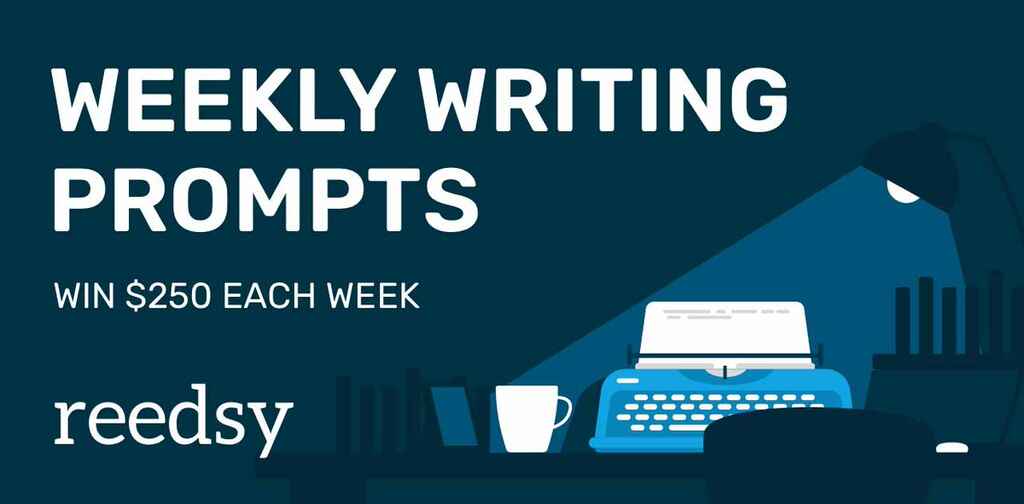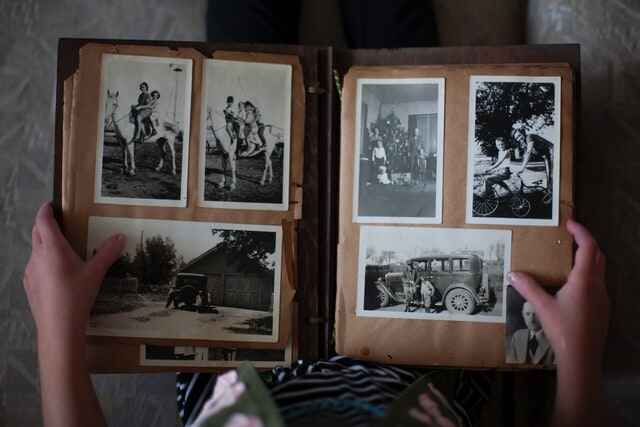Last updated on Oct 15, 2025
Please Steal These Ideas! 30 Things to Write About
Martin Cavannagh
Head of Content at Reedsy, Martin has spent over eight years helping writers turn their ambitions into reality. As a voice in the indie publishing space, he has written for a number of outlets and spoken at conferences, including the 2024 Writers Summit at the London Book Fair.
View profile →Don't just wait for an Amazing Idea™ to strike before you start writing. Sure, some writers can pluck spontaneous epiphanies out of thin air — but for the rest of us mortals, the process starts with writing about anything and building on that idea along the way.
To get you started (because starting is the most important thing) here are some ideas of things to write about! And if you want to steal them — go ahead! You have our permission.
Things to write about for fiction
For writers of fiction looking to move the hearts and minds of readers, here are 30 things to write about:
1. A popular story with an updated setting

Between myth and folklore, Shakespearean tragedies, and vintage classics, the stories that stand the test of time all have one thing in common: a message that has resonated with generations of readers. Refreshing the characters and location of a beloved story is a great way to make a timeless theme or perennial plot your own, reviving it for a new generation. For some guidance, take a look at this list of novels inspired by Shakespeare — or just rewatch Clueless.
Q: How can authors protect their rights when publishing, especially in the age of AI?
Suggested answer
I don't think anyone can fully protect themselves. If you act in good faith you will find that most other people will do the same. There will always be rogues, but selling books is hard enough if you are the real author, even harder if you have stolen it.
Andrew is available to hire on Reedsy ⏺
2. Your greatest fantasy, come true
Though it may seem like we all dream the same dreams — get rich, find love — human beings can be wildly creative with their fantasies. So, whether you dream of marrying a pop star, or hope they’ll hear you busking and join you in a duet that goes viral, why not delve a little deeper into yours?
3. Speculation about an event in your future
Much like a novel, the future is a wide expanse of possibility where anything could happen. But there are certain things you might expect (depending on where you are in life): you’ll get a job, you’ll retire, someone you love will be born, someone you gave birth to will fall in love. Charging your stories with real emotions and real people, by speculating about an event in your future, is sure to help your writing sing.
4. Something from a creative writing prompt
The internet is full of ideas for writers who don’t know what to write about. Some sources are better than others, and we think our resources are a great place to start — of course, we’re only a little biased. As well as a lovingly curated list of over 200 short story ideas, we also have a weekly prompts contest, providing five writing prompts based on a new theme each time. You can always join in with this week’s prompts, or explore the prompts of contests past!

5. A conversation, rewritten the way you wish it went
We’ve all been there: You have something to say, you’ve planned it out in your head, but you’re tongue-tied when the time comes. For days afterward, you think about how it might have gone, all the witty things you could have said. It’s torture, and a complete waste of time — unless you put it down on the page. Using real-life examples is a great way to practice writing dialogue — you never know where that conversation might lead.

FREE COURSE
How to Write Believable Dialogue
Master the art of dialogue in 10 five-minute lessons.
6. Something you feared would happen actually came true
The worriers among us are constantly (if inadvertently) coming up with things to write about — especially ideas for thrillers, suspense novels, and that part in a romance where everything goes wrong. Usually, these ideas come and go as soon as the thing you were worrying about turns out fine. But why not make those anxieties a (fictional) reality, and use them for the “rising action/all is lost” part of your story?
7. Opening lines inspired by each of the things around you

Those who wholly embrace the “pantsing” method often go as far as to write line-by-line. For this kind of writer inspiration might be as simple as “a storm” or “a rocking chair”. Curious? Try writing an opening line inspired by something in the room. If you like it, try the next line — it should feel necessitated by the first. And if that doesn’t work, move on to something more inspiring. Maybe a coffee cup holds the key to your next novel!
8. The plot of a song, embellished or re-invented
Many of the best songwriters are also incredible storytellers. But even the most narrative songs can be explored further. Has a song ever had you picturing its world and its people? Great! Listen to it again and dig into the lyrics: Who are the characters behind them? And what challenges are they facing? While you’re not trying to rewrite the song in prose — you want to get to know its people, circumstances, and setting so you can stretch them even further.
Q: How can I overcome the fear that my story idea isn’t original or good enough?
Suggested answer
It's easy to walk into a bookstore, pull a finished book off the shelf, read it, and think, "Oh no. I could never write a book like this. I'm not good enough to be a writer."
This kind of thinking is a trap! As an editor, I've read hundreds of early drafts. Even the most exciting, most polished manuscripts that passed my desk needed several rounds of intense editing before they were ready for publication. And I was often seeing manuscripts after they had been through a few revisions already. It's not fair to compare your first draft to a published book that's been through many rounds of professional editing. Everyone's first draft needs work. If you expect your first draft to be on the same level as a published book, then you're going to set yourself up for a lot of self-doubt and disappointment.
However, when you pick up a book and think I could never write this, that's actually true. Not because you're a bad writer, but because your voice is uniquely and distinctively yours. You won't be the next Rick Riordan or the next Angie Thomas--but that's because you're going to be the next you!
Camille is available to hire on Reedsy ⏺
Even seasoned authors struggle with imposter syndrome and doubt themselves. That said, doing your homework is not a bad idea. Find out what books are similar to yours and find out if there is a glut in the market for that topic or if there is a need or hole in the market, and your book might fill a need.
The reality is that good books are not written; they are rewritten. That's why it is so important to work with an editor who can help you revise the book and take it to the next level, so it can become the best it can be.
Melody is available to hire on Reedsy ⏺
Need an example? We once set this as a prompt for our weekly writing contest, and the winning story was ‘Suzanne’ by Rachel Dzengelewski — an utterly enchanting story that inhabits the world of Leonard Cohen’s song of the same name.
9. A memory, but from the perspectives of others involved
One of the challenges faced by memoirists is that memory is mostly (and inevitably) unreliable. This isn’t a problem in and of itself — certainly not for fiction writers — but it can make it easy to fall into the trap of making yourself the all-conquering hero or all-suffering victim of the story. To dodge this trap, and have some fun with structure, try writing about the same memory from the perspective of each person involved. Changing points of view can be a very fun exercise!
10. An imaginary interview with a stranger who draws your attention

Character questionnaires are a great tool for getting under the skins of your characters. If you’re in need of a starting point, you can't go wrong with an intriguing stranger. Imagining a character’s answers to a series of questions helps flesh them out, and can even provide a great idea for a story. But if you want to get really creative, why not experiment and write a narrative that takes the form of an interview, interrogation, or therapy session?
Q: What tools or techniques can authors use to develop detailed and effective character profiles?
Suggested answer
Writers can establish good character profiles by examining surface information and interior depth. Beyond physical description, notice personality, values, and contradictions—what the character wants vs. what the character fears. Techniques like freewriting as a character or writing the character's background can elicit subtleties that don't find their way into the main action but still affect behavior. Some authors use Q&A-type questions to explore motivations, habits, and relationships, and other authors create images of the character's past to observe how it affects present decisions. What is most important is consistency: when you know how your character thinks and behaves, their actions make sense, and readers feel that they are interacting with real people and not with plot devices.
John is available to hire on Reedsy ⏺
This is so important because the character will drive your story.. You reader has to be fascinated by your protagonist and be routing for him or her. I always interview my characters in depth. I don't just ask them about the basics of their lives and history. I ask them what they fear most in life, what makes them get up in the morning.
Joie is available to hire on Reedsy ⏺
I provide all my clients with a template that I devised myself for ensuring that every single character in a novel is fully fleshed-out, colourful and contrasting, both within themselves and to other characters.
Vanessa is available to hire on Reedsy ⏺
I've had success doing Enneagram quizzes in each character's persona. Even if you don't believe in personality profiles, it's a good way to check whether a character's goals, motivations, and considerations are consistent. They can reveal gaps where you still have a question to answer about a character's background and, best of all, it reassures you that you're writing characters who contrast with one another, rather than representing different aspects of your temperament as the writer.
Mairi is available to hire on Reedsy ⏺
The most important issue for each character is what they want. Desire and wants fuel the story, especially regarding what the main character wants. When two characters want the same thing, this is when tension can arise organically.
Melody is available to hire on Reedsy ⏺
11. A story about someone who has your childhood dream job, but they hate it
Want to feel better about your current job? It’s time to unpack the profession of your childhood dreams. Astronaut, popstar, lab scientist, or lollipop lady, trials and tribulations are faced by all — yes, even authors. That your character is in the job from hell is a given, but whether or not things are about to get better is entirely up to you.
12. A piece that starts with a sentence from the middle of a book
Grab a book off your bookshelf, flick to a random page, then point anywhere on that page and you’ve got your opening line. If it’s a complete dead-end, you’re permitted to try again, but try not to go hunting for something specific — this writing idea is all about randomness. You won’t be able to publish it if you’re plagiarizing that first line, so if you hope to publish the results, consider the random sentence to be a prompt, not an opening line.
13. Your life, if you had taken a different path
Whether or not you believe in fate, life is full of choices that dictate the paths we follow. Think back to a time when you made a decision that could be considered a turning point. Then, make a different choice. Where would you be now if you’d decided not to go to college? How might your life be different if you’d spent a year traveling? Feel free to take some creative liberties — this isn’t real life anymore.
14. Your favorite recipe, interspersed with whatever thoughts or narratives it brings to mind

There’s something about food that makes it a brilliant vehicle for reminiscence — whether it’s the smell of fish and chips transporting you to the seaside or the act of baking a cake unlocking childhood memories. So if you want to write something a little nostalgic or contemplative, try using a recipe or a simple narrative about cooking as an anchor for all your thoughts and (fictional or nonfictional) anecdotes. If you love the process, who knows? You could be publishing a beautiful book of recipes soon.
Q: What should I do if someone has already written a book with my idea?
Suggested answer
Write it anyway!
The market for books is huge and each writer's voice is unique. You will have a different way of presenting the informaiton or telling the story, even if it's similar to someone else's.
Alice is available to hire on Reedsy ⏺
Write a better book. There are many books written about the same topic, same ideas, same plots. You can't protect an idea, only the written expression of that idea. Go write your own book that is thoughtful, well-written, and thorough. A good book will find an audience.
Maria is available to hire on Reedsy ⏺
15. A randomly generated plot to use as a story within your story
Writers love to write about writers, but it’s not very often you find the plot of a novel within a novel — and we think that should change! Instead of using our plot generator the bog-standard way, why not use it to generate the material for a character’s work-in-progress. Start with their weird and wonderful concept for a plot, then let it influence their life — directly, indirectly, or in a surreal, metatextual way!
16. A character who does all the things you’re not brave enough to do
Despite their active imaginations, writers tend to be indoor people who are often more likely to read about wild adventures than actually want to go on them. So, one way to create a narrative as entertaining as those you read is to make your character do all the wild and adventurous things you wish you had the spontaneity to do — and see where it takes them. (If you’re so inclined, you could do all the adventurous things yourself, of course, and then you’d have the material for a book based on your real-life experiences.)
17. The 'untold stories' of old photographs

Whether you scroll on your phone, pull the family albums down from the loft, or search through boxes at a flea market, looking at old photographs is a great way to stumble across the setting, characters, events, or emotions of your next great piece of writing.
18. Wrong answers to Google’s most-asked questions
Sure, kids say the darndest things. But it turns out adults Google the darndest things. So if you want to respond to today’s most pressing concerns, or just write a quirky story, turn to mankind’s Google searches for questions like, Why were cornflakes invented?, Can we go to heaven with tattoos? Can dogs eat bananas? Strawberries? Apples? To see how it’s done, check out Tara Campbell’s Angels and Blueberries.
19. A piece inspired by an offbeat news headline
You know what they say: sometimes the truth is stranger than fiction. And after looking up offbeat headlines, it certainly seems that’s the case. While some are only good for a laugh, hidden among the world’s weird news stories are some real nuggets of gold — perfect for a humorous short story or a bizarre inciting incident!
Q: Should I follow current trends or write the story I’m most passionate about?
Suggested answer
If you write a book inspired by 2025 trends you might find that by the time it's ready for submission and even publication the trend has moved on to something new. It takes a long time to write a book: you have a better chance of sustaining momentum and enthusiasm if you stick to your passion project. I rather believe that readers pick up on that passion too.
Susanna is available to hire on Reedsy ⏺
The issue with following current trends is that the trend may be over before you get your book completed and out to the world. If you write what you are passionate about, the story will usually end up being stronger because you are writing a story that means a lot to you, as opposed to writing something just because you think it might sell.
However, you want to be sure the story you are passionate about still has a strong possibility of selling by avoiding cliches and plots that have been overworked and overdone.
Strong stories that readers can relate to will have a good chance of finding an audience no matter the genre.
Melody is available to hire on Reedsy ⏺
20. Your daily journal, but with an unusual twist
Writing in a daily journal is not only cathartic (just ask all those angsty teenagers), it’s also a great way to build your writing habit and nurture your creativity. But if documenting your life isn’t your style, you’ll need to think outside the box. You could try writing in the style of a journal from the perspective of a fictional character (in the spirit of Lionel Shriver’s We Need to Talk About Kevin), or writing out of chronological order — anything that gets your creative cogs whirring and puts you on the path to a great idea!

FREE COURSE
How to Build a Solid Writing Routine
In 10 days, learn to change your habits to support your writing.
Things to write about for nonfiction and blog posts
Need inspiration on nonfiction topics? Don't worry — just take one of these 10 ideas for things to write about:
21. Today’s headlines, told by the devil's advocate

The strongest content is highly topical, and the best of the best will also make readers question what they know. So when you run out of things to write about, scour recent headlines for one that interests you. Make sure you’re clued up on the topic, then generate debate by questioning the standpoint of the article. You don’t need to disagree, just probe the argument for weaknesses — there’s always at least one.
22. The last time someone changed your opinion
Getting someone to question what they know is one thing, but changing their opinion for good is an entirely different ball game. So when someone succeeds with you, it can be quite a momentous occasion. Think back to the last time you had your mind changed. What was it that swayed you? What was your existing opinion? And how do you feel about the subject now? Maybe you can change someone else’s mind too.
Q: What types of nonfiction authors are likely to succeed without an agent, and why?
Suggested answer
If you are a celebrity or significant political figure and are really going to only write one book, you are probably better off having a lawyer who bills by the hour than an agent to whom you have to pay 10-15%. Examples of people who used a lawyer instead of an agent include President Bill Clinton, Nikki Haley, Karl Rove, Janet Yellin among others.
Tom is available to hire on Reedsy ⏺
If you have a large platform (like a big social media following, an influential organization, or an active speaking career), take a look at the world of hybrid publishing. Hybrid publishing allows you to bypass the agents and editors in the traditional publishing world, and gives you more control over your finished product.
Hybrid publishing can be expensive. It's worth the investment if the book is a tool in your tool belt, and a way to build more authority in a field in which you're already well-known. If you are confident that your platform can drive sales without a dedicated publisher marketing team, it can be a great option!
Kate is available to hire on Reedsy ⏺
23. An in-depth visitor’s guide to your hometown
Visitor’s guides: whether it’s the dull tweedy books that collect dust in the spare room or the online listicles — neither option is quite cutting it. Give the people what they want and create an honest insider’s guide to your hometown. You could make top 10 lists, annotate a guided walk, or write a “week about town” handbook — get creative, and don’t be afraid to add a personal touch. (And, if you’re feeling particularly witty, don’t be afraid of satire!)
24. A new hobby, documented

If you’ve taken up a new hobby, no matter how obscure, chances are there are a bunch of people out there thinking about doing the same — and they want to know what they’re in for. So become that person — the one who can provide them with everything they need to know every step of the way: the beginner’s kit, the best place to start, the mistakes you wish you’d known before starting, and the thoughts and feelings of someone who’s been there, done that.
25. An honest letter to your younger self
The internet is full of advice on how to write a letter to your younger self — but authenticity may be the best way to approach such a deeply personal task. This exercise can be a really therapeutic way to heal old wounds, but it can also be a great way to poke fun at the clothes you wore in the past. Let your voice lead the direction of your letter. You’ll probably find that people relate to your writing without you giving them a second thought.
26. Room 101: your picks explained
Ever wish you could get rid of that thing that grinds your gears? Or curls your toes? Or makes the hairs on the back of your neck stand on end? Room 101 is a hypothetical place where things can be sent in order to be eliminated from existence. Whether it’s magicians, moths, or taramasalata, have your rant and create engagement by asking your readers whether they share the same pet peeves and worst nightmares as you.
Q: What research should memoir writers conduct to ensure accuracy and depth before starting their first draft?
Suggested answer
When it comes to memoir, I think the most important thing to remember is, as obvious as it might sound, that the life of my client is the primary source.
That said, everyone's memory is slippery-we recall moments through the filter of emotion, later experience, and even family stories that may have become wildly embellished over the years. So, before I start drafting, I like to ground myself in two kinds of research: personal verification and contextual enrichment.
On the personal side, that might mean digging out old diaries, letters, emails, or even photographs. These aren’t just memory prompts; they help pin down details like dates, places, and the texture of a moment.
Talking to family or friends who shared an experience can also provide perspective. Sometimes they’ll remember things differently, which doesn’t have to undermine your story but can add depth and nuance.
On the contextual side, I’ll often research what was happening more widely at the time. What music was playing on the radio? What political or social events were unfolding in the background? Even small things, the price of a bus ticket, the football results that weekend, can enrich a scene and anchor it in time as well as act as a wonderful prompt or reminder.
In short, memoir research is less about becoming an 'archivist' of someones life (which makes it seem very technical anyway, which is not what you want at all) and more about giving yourself the tools to write with honesty, clarity, and texture. The aim isn’t to eliminate subjectivity (memoir thrives on it), but to make sure the shared recollections are as vivid and trustworthy as they can be-you will, with this in mind, notice what might best be called a 'disclaimer' in some memoirs which openly admit to how some stories may not be quite as they were at the time, else two or three characters known to the author have been combined into one.
As a ghostwriter, I carry out this same process alongside my clients: helping them test their memories against records, conversations, and cultural backdrops. That way, when we arrive at the first draft, we’re building not just on memory but on memory enriched — a story that feels authentic to the writer and alive to the reader.
Edward is available to hire on Reedsy ⏺
A memoir needs to be ghostwritten as the author themselves would write it, if they could. Further research shouldn't be necessary, unless there are facts that the author asks the ghost to confirm. If you start talking to other people you risk losing the author's own voice.
Andrew is available to hire on Reedsy ⏺
27. An ode to your addictions
Maybe you’ll find yourself writing a humorous love letter to sugar, maybe you’ll write about your favorite TV show, maybe you’ll reflect on a more concerning kind of addiction. Whatever it is, think about what draws you back to this thing or behavior, the feeling of giving in or refusing to give in to your addiction, and how your life is different because of it. Then you can think about the broader implications of people having this addiction, how it changes society, or how it’s perceived by other people. From there, you may glimpse the potential for a longer writing project.
28. A famous quote, unpacked
From intriguing observations like Tolstoy’s “each unhappy family is unhappy in its own way” to George Eliot’s “the growing good of the world is partly dependent on unhistoric acts,” there is no shortage of thought-provoking statements that can spark a reaction, whether you look for them in literature or in the daily news cycle. Find a line that speaks to you, and allow your thoughts and feelings to pour out. The result could be confessional, argumentative, or matter-of-fact in tone, but the idea is that you’ll come across an interesting thought of your own in the process, and then pursue that.
29. A blend of your own experience with research on a related topic
Is there an issue that you feel affects your life significantly? From gardening to loneliness among elderly people and animal rights, if there’s something you feel strongly about, research it online. Read a few newspaper or magazine articles (preferably written by well-established or unbiased publications) relating to this issue, or if it’s particularly complex and you have the energy for it, look at academic studies related to it. Start writing your reflections as a response to this information — does your experience confirm what you’ve read? How does it deviate from examples mentioned? Is there a particular aspect of this issue you haven’t read about, that you think is key? Start by answering these questions.
30. The act of writing itself

Time to go meta — a fun thing to write about is writing itself! Why not look at these witty bon mots about creative writing as a jumping-off point if you like, or simply reflect on your own experiences with putting pen to paper. Think about when you’re most productive, what the process feels like, what you struggle with or what you find most satisfying about writing. Ask yourself why you write, and answer as honestly (and extensively) as you possibly can. A little soul-searching can be fun!
We hope these ideas have been helpful in your journey to find things you can write about — even if you don’t see an idea that immediately jumps at you as fascinating, try having a go anyway. Inspiration sometimes takes a few minutes to arrive!








